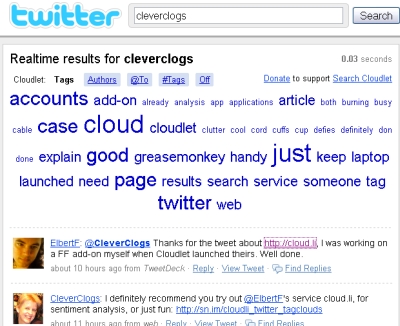Until a couple of days ago, I had not heard of INTSPEI – the International Software and Productivity Engineering Institute. But, boy, am I glad I bumped into them. The New York/Kiev company focuses on cranking up human productivity by devolving as much grunt work as possible to computers.
Its slogan is “Humans Should Not Do Computers’ Jobs”. You can read plenty about the vision, aspirations and background of the company on its website. For now, let’s look at what attracted me to it: an extension to searches which presents the most popular words in the results as a ‘tag-cloud’ which appears at the top of the page. (Word size is a reflection of its frequency in the search results.)
Here’s an example of the company’s Search Cloudlet working with Google’s web search results (it also shows up on Google’s News, Blogs, Scholar and Shopping pages) :

INTSPEI’s Search Cloudlet atop Google’s results
You can see that I kicked the search off with “desktop productivity software” and I can now click on a term in the cloud which helps refine my search. Each new set of results presents a new cloud. You can click on ‘Sites’ to see which websites are contained in the results, or ‘Net’ to find the top-level domains: you might want to refine your results by country, for example.
The software also works with Yahoo! Web and News searches and, a couple of days ago, it was made available for the Twitter micro-blogging service. Here, it greatly enhances your ability to find out ‘has anyone mentioned xxx?’ You get real answers from real people and you can, again, instantly extend the search by clicking on the tag words.
Here’s a Twitter search for CleverClogs a.k.a. Marjolein Hoekstra, the person who first tipped me off about the service:

INTSPEI’s Search Cloudlet atop Twitter’s results
To enjoy this browser extension for free (or for a donation – your call), you need to be using Firefox. I won’t drone on but I’ve been using it for years and only venture into Internet Explorer when I’m absolutely forced to. You can download the Cloudlet add-on for Firefox here.
INTSPEI is also developing P-Navigator, currently a Windows desktop application, which integrates with existing enterprise, desktop and internet search engines and provides a range of tools to improve the productivity of knowledge and information workers.
At a click, you can refine your searches as described above but you can also find which pages link to the found pages, the pages linked to from them, tree and branch relationships between them, display documents, and more.
Although the product is in closed beta at the moment the information on the P-Navigator web pages reveals the maturity of thinking of this organisation.
Anyone whose products are motivated by “Humans Should Not Do Computers’ Jobs” definitely gets my vote. I’ll be keeping a close eye on this interesting organisation.
Through our research and insights, we help bridge the gap between technology buyers and sellers.



Have You Read This?
Generative AI Checkpoint
From Barcode Scanning to Smart Data Capture
Beyond the Barcode: Smart Data Capture
The Evolving Role of Converged Infrastructure in Modern IT
Evaluating the Potential of Hyper-Converged Storage
Kubernetes as an enterprise multi-cloud enabler
A CX perspective on the Contact Centre
Automation of SAP Master Data Management